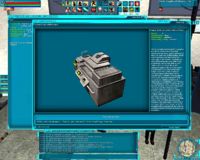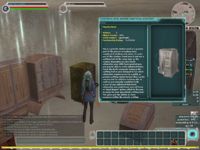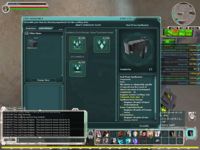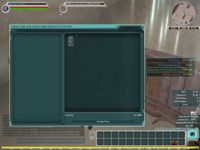Crafting Stations (Game Mechanics)
| This article or section needs proper wiki formatting. |
Game Mechanics - Mechanics Category
SWGANH Wiki is a repository of Star Wars Galaxies Developer information. This site is only meant to be used by SWGANH Developer team.
|
|
Crafting Station MechanicsGeneral information:
There are two types of crafting stations, with these being Public and Private. Public crafting stations are located (surprise!) in public and handle schematics ranging from complexity 21-25. You'll usually see them near marketplaces in cities. A private crafting station is purchased and can be stored in your inventory like other objects, then dropped in a house and used like a public crafting station. Private stations handle all schematics.
Effects of Item Complexity
When an item goes through the full crafting process and is completed, the crafting tool will take an amount of time equivilant to 2 x complexity of schematic as the total number of seconds that will pass before the item is created as a prototype from the crafting tool. For factories this timer is 8 x complexity of schematic and determines the total time that it will take in seconds for each item to be produced and deposited into the factory output hopper. Item complexity's effect on the selection of available schematics comes in the following manner. These schematics only show up to the player in the crafting tool if they meet the appropriate qualifications. Item schematics are broken down into 3 categories. The first category are those schematics that can be used with a generic crafting tool. These incorporate all schematics that range from complexity 1 to 15. The second category are those schematics that can be used with only a specialized tool. These schematics range from complexity 16-20. The third grouping of schematics are those that require a specialized tool and at least a public crafting station (those found in npc cities or ranger camps). These schematics range from 21 to 25. The fourth and last grouping of schematics are those that require a specialized tool and a private (player crafted) crafting station. For clarification, all lower tiered schematics can be used by the next highest tier. This means that schematics from 1-20 can be used with just a specialized tool, 1-25 complexity can be used at a public station with a specailized tool, and a private station with a specialized tool can use all schematics.
Crafting Station Functionality Rating This is an attribute of the crafting station itself. Its function is to serve as a modifier to the random roll event for experimentation and assembly attempts. Having a positive value in this will mean a bonus to the roll, where having a negative will decrease chances of favorable rolls. Public stations have a default value of 0.00. Private stations can vary widely in this depending on quality of resources and components used.
Crafting stations come with an accessory storage compartment called an Input Hopper. The input hopper is basically another container from which the player may have access to in order to allocate resources/components from and put into the resource slots directly. You can also access the input hopper by standing within 6 meters next to a crafting station. To access the hopper you will need to open the crafting tool by bringing up the radial menu of the crafting station and after a second, you'll see "open input hopper". This brings up another window representing the hopper, and you can drag resources into it from your inventory. Once you've put resources in, you can use them by using the "Hopper" tab during the resource selection step of crafting (assuming you're close enough to the station). Only people with admin rights to the house can access the hopper. So your friend would be able to put resources in and take resources out, and (if he's a crafter) can use the resources during his crafting session. People without admin access to the house get a "you do not have rights to access the hopper" message if they try. The hopper shares the same container rules as other containers. It does not allow containers to be placed in it, nor sharing of datapad item.
The station hopper my also be accessed via using a specialized crafting tool. Normally this is opened by using the open input hopper option on the crafting station radial but for crafting tools in order to activate it, the player must be within the normal range to open the input hopper. Manipulating the input hopper also requires a specialized tool for that particular type of station. A structure and furniture station requires a structure and furniture tool to be able to have access. If you're standing next to your crafting station, use a specialized crafting tool, click to get the tool's radial menu, hold on the "start crafting" radial and a new option should pop open that says Open Input Hopper. Click that and the crafting station opens up and you can drag your resources in. A crafting station hopper may hold up to 100 items however these do count towards the house item limit.
Crafting Station Attributes1. Variation Of: This attribute spawns on any weapon that has had its base type name changed. For player crafted weapons this type change occurs when the player renames the weapon from the default given one. The name change can occur automatically as the player chooses a particular style for the item during the customization process or by manually renaming the item in the name field. After changing the name the weapon now indicates that it is a variation of the specific type that it originated as. For looted weapons, this attribute occurs only on weapons that have been given the exceptional or legendary tags.
Represents the current container contents of the station.
This attribute appears only on crafted stations. The crafter's name is listed here. 4. Functionality Rating Its function is to serve as a modifier to the random roll event for experimentation and assembly. Having a positive value in this will mean a bonus to the roll, where having a negative will decrease chances of favorable rolls. Public Stationis in npc cities all have a 0.00 effectiveness rating. Functionality rating displays the result of up to 6 decimal places. Source References |
Bold text |



